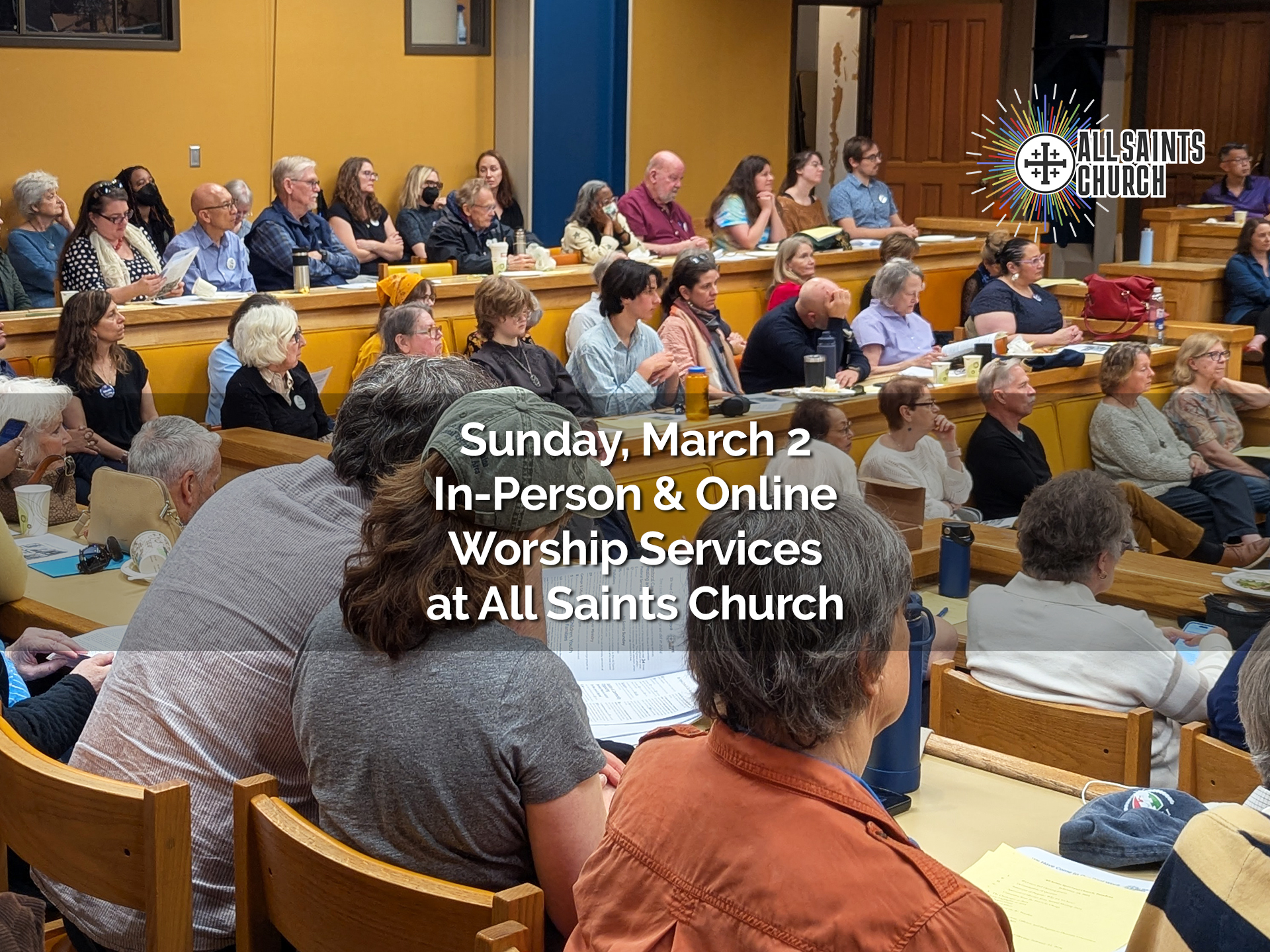by Mike Kinman, Rector of All Saints Church, Pasadena
The gospel isn’t meant to be gulped down on Sunday morning, but gnawed on through the week so it really becomes a part of us. You’ve got to work at it, like a dog with a good bone! Here’s the Gospel for this Sunday with some notes and more “food for thought.”
John 3:1-17
There was a Pharisee named Nicodemus, a leader of the Jews. He came to Jesus by night and said to him, “Rabbi, we know that you are a teacher who has come from God; for no one can do these signs that you do apart from the presence of God.” Jesus answered him, “Very truly, I tell you, no one can see the kingdom of God without being born from above.” Nicodemus said to him, “How can anyone be born after having grown old? Can one enter a second time into the mother’s womb and be born?” Jesus answered, “Very truly, I tell you, no one can enter the kingdom of God without being born of water and Spirit. What is born of the flesh is flesh, and what is born of the Spirit is spirit. Do not be astonished that I said to you, ‘You must be born from above.’ The wind blows where it chooses, and you hear the sound of it, but you do not know where it comes from or where it goes. So it is with everyone who is born of the Spirit.” Nicodemus said to him, “How can these things be?” Jesus answered him, “Are you a teacher of Israel, and yet you do not understand these things?
“Very truly, I tell you, we speak of what we know and testify to what we have seen; yet you do not receive our testimony. If I have told you about earthly things and you do not believe, how can you believe if I tell you about heavenly things? No one has ascended into heaven except the one who descended from heaven, the Son of Man. And just as Moses lifted up the serpent in the wilderness, so must the Son of Man be lifted up, that whoever believes in him may have eternal life.
“For God so loved the world that he gave his only Son, so that everyone who believes in him may not perish but may have eternal life.
“Indeed, God did not send the Son into the world to condemn the world, but in order that the world might be saved through him.”
The Backstory – What’s Going On Here?
From now until Palm Sunday, we move from Matthew’s Gospel (the main Gospel for Year A) to John’s Gospel (which doesn’t have its own lectionary year but which gets inserted in various parts of the church year … for example, in Lent!). This is early in John’s Gospel (Chapter 3), but already a lot has happened. Jesus has gathered his disciples, performed his first sign changing water into wine at Cana and drove the moneychangers out of the Temple (and made the first prediction of his resurrection to boot). Now, fresh off the cleansing of the Temple, he has a Pharisee approaching him in the dead of night. Rather than Jesus confronting the authorities, the authorities are coming to Jesus and calling him teacher.
The conversation Jesus and Nicodemus has is one of identity. For a Jew, identify is through birth (which in their case would be matrilineal). You are one of God’s chosen people because you are born of a Jewish mother. But Jesus is saying something else … that your identity comes from God, from being “born anew” or “born from above.” Birth generates identity. Physical birth is necessary for life, but we need to know that our deepest identity comes not just from our birth but from God. Being “born again” or “born from above” is not something added that happens to us, but claiming what has been the deepest part of all of us from the beginning.
A few things to chew on:
*Who are you? When you think about it, it’s not an easy question to answer.
All sorts of questions come from it. What is your name? What do you do?
Where did you grow up Where did you go to school? All these things make up our identity. My name is Mike Kinman. I am a priest and rector of All Saints Church. I grew up in Tucson, Arizona. I am a husband to Robin and father to Schroedter and Hayden.
To this, Jesus would say, “NO … I said “WHO ARE YOU!” and I would need to dig deeper. I am a child of God. I am a follower of Jesus. I am a grateful work in progress who doesn’t have everything figured out. Those answers don’t invalidate the first set of answers — but they turn the information of name, race, education, job, etc. into what they really are — expressions of who we are created as God’s child, as a follower of Jesus. So again, who are you?
*As a Pharisee, Nicodemus believes that God’s special affections are reserved for God’s chosen people — the Jews. Jesus explodes that, and it’s clear in one of the most quoted passages in all of Christian scripture: John 3:16 “For God so loved the world that he gave his only Son, so that everyone who believes in him may not perish but may have eternal life.” God so loved THE WORLD. That’s everyone. It’s human nature to assume — or hope — that we are special in God’s eyes. Many Christians use John 3:16 as a proof text for God’s preferential option for Christians. That kind of Christian exceptionalism is not only harmful but fairly ironic given what this passage is about. What John 3:16 should drive us to is not a feeling of superiority but should drive us to our knees in humility. In a world that is full of diversity, conflict, disparity, injustice and on and on and on, the one common denominator is that God loves the WHOLE world. How can we conceive of that kind of love? How can we participate in that kind of love? If the whole world is God’s beloved … what does that mean for how I live in and with the world?
Try This:
“Indeed, God did not send the Son into the world to condemn the world, but in order that the world might be saved through him.” Lent is a time of self-examination and penance. Of being aware of those places where we have drifted away from God and doing the necessary course corrections to get us back directed Godward.
But it’s important throughout this season not to let penance morph into a belief that we are evil, a belief that God’s gesture to us is a menacingly pointing finger. God’s gesture toward us is an embrace. God’s dream for us is to trust in that embrace and to embrace God back. Our sin is when we resist that — and that resistance is it’s own punishment.
This week, each morning begin the day remembering what you have taken on or given up this Lent … then stop and affirm that your Lenten discipline is not born out of God’s condemnation of you but is a love offering for a God that wants nothing more to hold you to the divine heart. Carry that with you as you go through the day.
Up All Night
But at night,
when all the world’s asleep
The questions run so deepfor such a simple man
Won’t you please, please tell me what we’ve learned
I know it sounds absurd,please tell me who I am,
–The Logical Song, Supertramp
Some of the best conversations I’ve ever had were at night.
Summers home from college, my friends and I would end up at Denny’s at two in the morning because it was the only place open and we would just talk until we couldn’t stay awake any longer.
When my kids were tiny and I used to tuck them in and say prayers with them at night, they would ask me questions and we would talk — partly because they wanted to put off bedtime as long as possible, but also because there’s something about the night that is a safe place for the deepest of questions.
Some of our best, deepest conversations happen at night. We’re up late with friends or lovers. We’re tucking our children into bed. Somehow the cover of night and the slow of time from the busyness of the day invites us to ponder mystery and to walk on sacred ground together.
What nighttime conversations do you remember?
The Gospel tells us that Nicodemus came to Jesus by night. Scholars suppose it’s because he didn’t want the other Pharisees to see him, but I wonder if it wasn’t something more. I wonder if it isn’t because, as Supertramp sings, nighttime is the time when we ask those questions that truly run deep, questions of who we really are.
For many of us, our lives have become to busy for those conversations. We work all day, try to find time for family and friends, and collapse into bed exhausted at the end of the day. Myself, I have to get up early in the morning to do my prayer and scripture study because I can’t keep my eyes open at the end of the day.
And I know I’ve lost something. Something I really need to recapture.
What would it be for us if we reserved some Nicodemus time — for ourselves with Christ in prayer and for ourselves with each other?
What conversations are out there waiting to have with Jesus and with one another. What questions are out there to be asked?
Nicodemus proves there are no stupid or unaskable questions. What are your questions? The questions that run so deep? The questions about who you really are?
Ask them at night. The answers might change your life.
Check out the rest of Sunday’s readings
The Lectionary Page has all of the readings for this Sunday and every
Sunday -[1] [2]click here for this Sunday’s readings.
Collect for Sunday
Pray this throughout the week as you gnaw on this Gospel.
O God, whose glory it is always to have mercy: Be gracious to all who have gone astray from your ways, and bring them again with penitent hearts and steadfast faith to embrace and hold fast the unchangeable truth of your Word, Jesus Christ your Son; who with you and the Holy Spirit lives and reigns, one God, for ever and ever. Amen.
Want to read more?
“The Text This Week” is an excellent online resource for anyone who wants to dive more deeply into the scriptures for the week.



